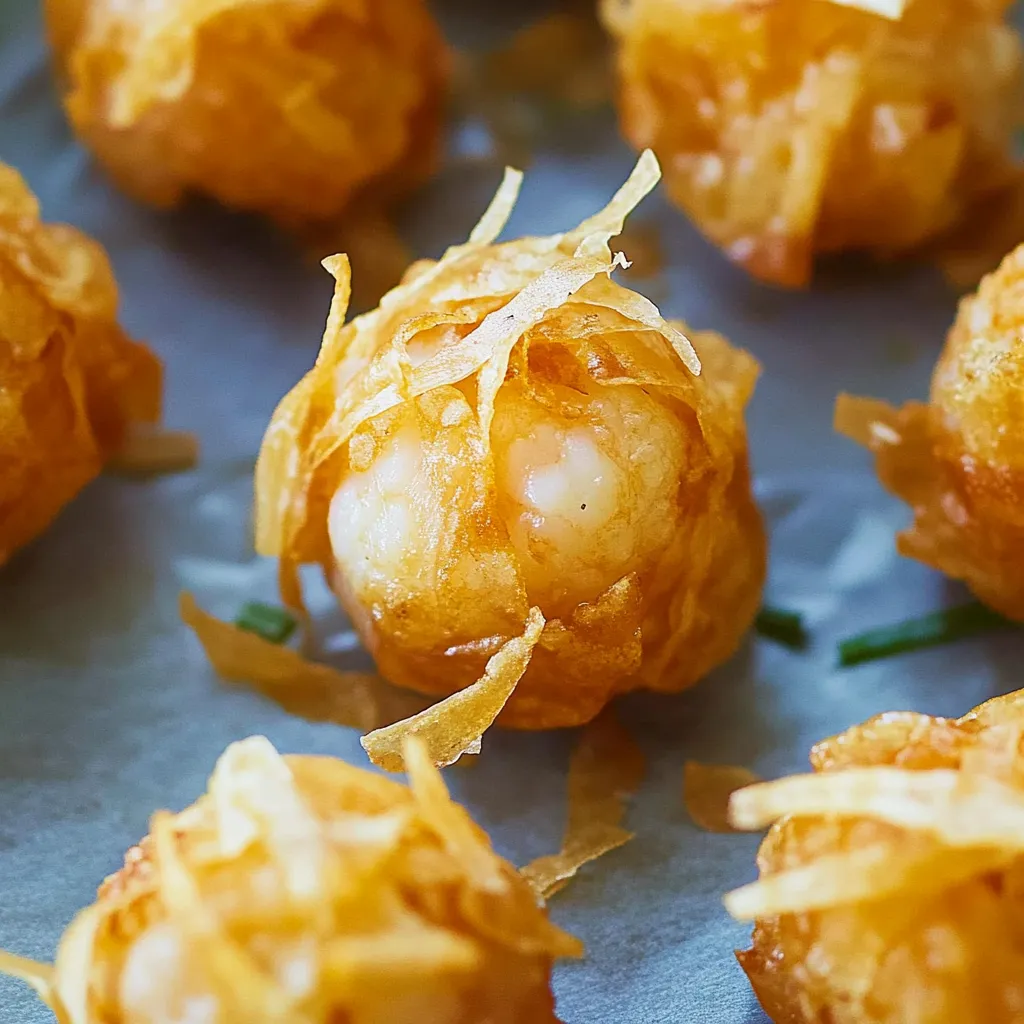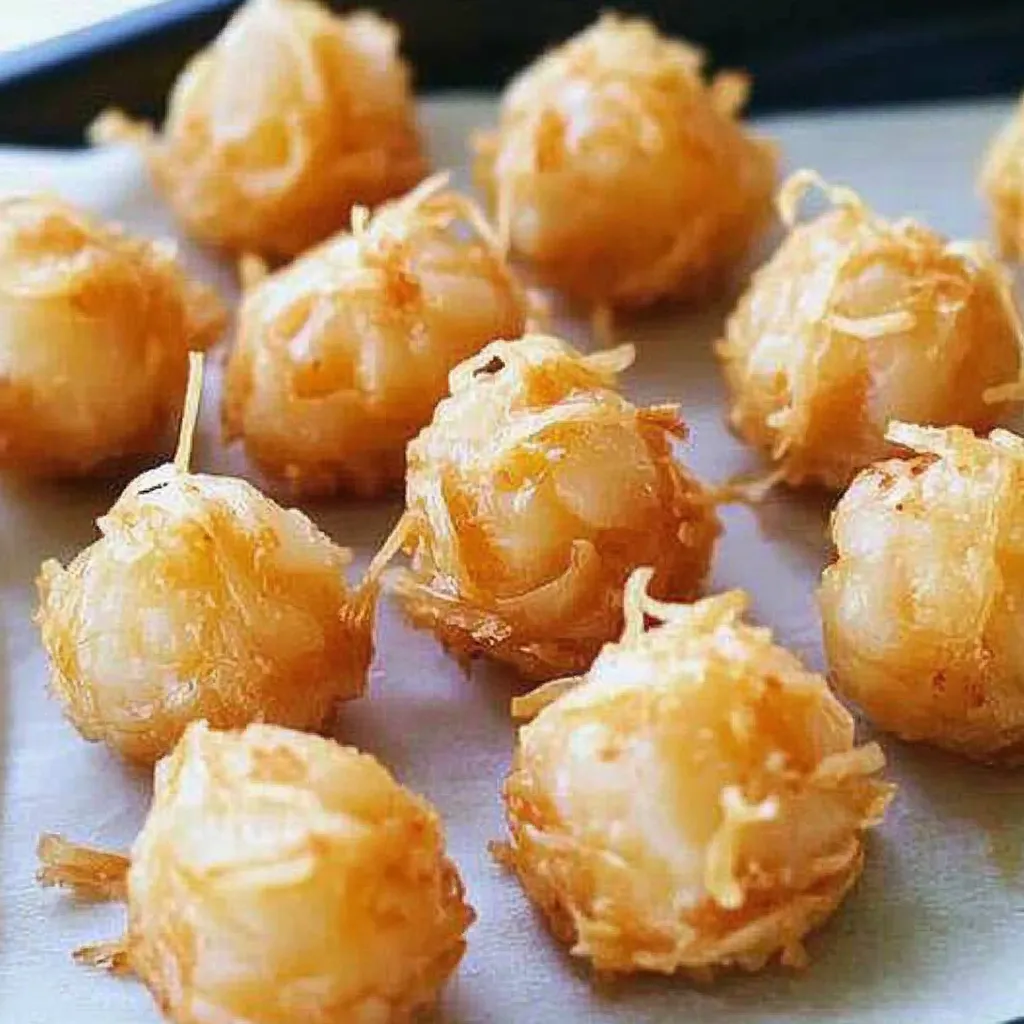 Pin it
Pin it
These crispy fried shrimp balls deliver all the authentic flavors of traditional dim sum with a perfectly tender shrimp filling wrapped in golden, crunchy spring roll wrapper strips. The technique of hand-chopping fresh shrimp into a seasoned paste creates incredible texture and flavor that's far superior to processed alternatives, while the spring roll wrapper coating provides that signature crunch that makes these irresistible. Unlike complicated dim sum dishes that require specialized equipment or hard-to-find ingredients, this recipe brings restaurant-quality results to your home kitchen using accessible ingredients and straightforward techniques.
I discovered this recipe when I was craving the shrimp balls from my favorite dim sum restaurant but couldn't justify the drive and expense for just one dish. The first time I made them, I was amazed at how closely they matched the restaurant version, and my family couldn't believe I'd made something so professional-looking and delicious at home.
Essential Ingredients and Selection Tips
- Raw shrimp: Choose U50-60 size for economy; they must be peeled and deveined completely, and fresh or properly thawed frozen both work perfectly
- Spring roll wrappers: These are essential for the long strips needed; wonton wrappers are too small and won't create the proper coating effect
- White pepper: This provides the authentic Chinese flavor profile; black pepper can substitute but won't taste quite the same
- Light soy sauce: Use regular soy sauce, not low-sodium or dark varieties; the light version provides the right color and saltiness balance
- Shaoxing wine: This Chinese cooking wine adds authentic depth; chicken stock works as a substitute but won't provide the same complexity
- Sesame oil: Use pure sesame oil for finishing; this adds the nutty aroma that's essential to authentic Chinese flavors
- Cornstarch: This binds the mixture and keeps it moist; potato starch can substitute but cornstarch is more readily available
- Neutral frying oil: Avocado, canola, or vegetable oil work best; avoid olive oil which has too low a smoke point for proper frying
The secret to perfect shrimp balls is hand-chopping the shrimp to control texture and chilling the mixture to help it hold together during forming and frying.
Detailed Step-by-Step Instructions
- Step 1: Prepare the shrimp properly:
- Pat the peeled and deveined shrimp completely dry with paper towels to remove excess moisture that could make the mixture too wet. Using a sharp knife, chop the shrimp into small pieces, then continue chopping until you have a coarse paste with some larger pieces remaining for texture - don't make it completely smooth.
- Step 2: Create the seasoned paste:
- In a medium mixing bowl, combine the chopped shrimp with minced garlic, white pepper, salt, light soy sauce, sugar, sesame oil, Shaoxing wine, and cornstarch. Mix everything in one direction only - this helps develop the proteins and creates better binding.
- Step 3: Develop the mixture:
- Continue mixing in one direction for 2-3 minutes until the mixture becomes sticky and paste-like, holds together when squeezed, and feels cohesive. This step is crucial for ensuring the shrimp balls hold their shape during frying.
- Step 4: Chill for better handling:
- Place the shrimp mixture in the freezer for 20-30 minutes to firm up - this makes forming the balls much easier and helps them maintain their shape during the coating and frying process.
- Step 5: Prepare the wrapper strips:
- While the mixture chills, lay out spring roll wrappers on a clean surface and cut them into ¼-inch wide strips using a sharp knife or kitchen scissors. Separate the strips and lay them out on a parchment-lined baking sheet so they're ready for coating.
- Step 6: Form the shrimp balls:
- Wet your hands with water to prevent sticking, then scoop a heaping tablespoon of the chilled shrimp mixture and gently roll it into a ball between your palms. Keep the size consistent for even cooking - about 1½ inches in diameter works perfectly.
- Step 7: Apply the wrapper coating:
- Place each shrimp ball onto the bed of spring roll wrapper strips and gently roll it around, pressing lightly so the strips adhere all over the surface. Trim any excessively long strips with scissors so they don't extend too far from the ball.
- Step 8: Heat the oil properly:
- In a wok or heavy-bottomed pot, heat neutral oil to exactly 350°F using a thermometer - this temperature is crucial for achieving crispy exteriors without overcooking the delicate shrimp interior.
- Step 9: Fry in batches:
- Carefully lower 4-5 shrimp balls into the hot oil, being careful not to overcrowd which would lower the oil temperature. Fry for 4-5 minutes, turning occasionally, until the wrapper strips are golden brown and crispy all over.
- Step 10: Drain and serve:
- Remove the fried shrimp balls with a slotted spoon and place on paper towels to drain excess oil. Serve immediately while hot and crispy with your favorite dipping sauce.
 Pin it
Pin it
The most important technique is maintaining proper oil temperature throughout frying and not overcrowding the pan, which ensures even cooking and maximum crispiness.
This recipe has become my go-to when I want to impress guests with something that looks and tastes restaurant-quality but doesn't require professional training to execute. My neighbor, who grew up eating dim sum in San Francisco's Chinatown, was shocked that these tasted so authentic and asked me to teach her the technique.
Understanding Shrimp Protein Science and Texture Development
The success of these shrimp balls depends on understanding how shrimp proteins behave when processed and cooked. Hand-chopping rather than machine processing allows you to control the texture precisely, leaving some larger pieces that create appealing bite variation. The mixing in one direction helps develop the proteins' natural binding properties, creating a cohesive mixture that holds together without additional binders. The salt and cornstarch work together to extract and bind proteins, while the brief chilling period allows these proteins to set properly before forming.
Spring Roll Wrapper Coating Techniques
The spring roll wrapper strips create a unique texture that's impossible to achieve with other coatings. Unlike breadcrumbs that create uniform coverage, the long strips create varied textures with some areas having multiple layers and others having single strips. This variation is what makes the coating so interesting and authentic. The strips must be cut to the right width - too wide and they won't adhere properly, too narrow and they won't create enough coverage. Proper application requires gentle pressure to ensure adhesion without compressing the delicate shrimp balls.
Oil Temperature and Frying Science
Achieving the perfect 350°F oil temperature is critical for proper texture development in the coating while ensuring the shrimp cooks through without becoming tough. At this temperature, the wrapper strips immediately begin crisping and forming a barrier that prevents oil absorption while allowing heat to penetrate and cook the shrimp gently. Lower temperatures result in greasy, soggy coating, while higher temperatures burn the delicate wrapper before the shrimp cooks properly. Using a thermometer and frying in small batches maintains consistent temperature for optimal results.
Flavor Balance and Seasoning Principles
The seasoning blend reflects traditional Chinese flavor principles, balancing salty (soy sauce), sweet (sugar), aromatic (sesame oil), and warming (white pepper) elements. The Shaoxing wine adds depth and helps tenderize the shrimp proteins, while the garlic provides pungent aromatics that complement seafood beautifully. Each ingredient serves a specific purpose beyond just flavor - the cornstarch binds, the sesame oil adds richness, and the wine helps develop texture. Understanding these roles allows for successful substitutions when needed.
Food Safety and Storage Considerations
Proper handling of raw shrimp and hot oil requires attention to food safety principles throughout preparation and cooking. The shrimp must be kept cold during prep and cooked to proper internal temperature during frying. The brief freezing period firms the mixture for easier handling while maintaining food safety. Hot oil presents burn risks, making proper equipment and technique essential. Leftover shrimp balls lose their crispy texture during storage but can be successfully reheated in an air fryer to restore much of their original appeal.
These fried shrimp balls have taught me that some of the most impressive dishes come from understanding traditional techniques rather than relying on shortcuts or modern conveniences. Every time I make them, I'm reminded that taking the time to do things properly - like hand-chopping the shrimp and maintaining proper oil temperature - creates results that simply cannot be achieved any other way.
Frequently Asked Questions
- → Can I use frozen shrimp for this recipe?
- Yes, just make sure to thaw and pat them completely dry before mincing into a paste.
- → What can I substitute for spring roll pastry?
- Spring roll pastry is essential for the right texture. Wonton wrappers won't give the same crispy result.
- → How do I know when the oil is hot enough?
- Use a thermometer to reach 350°F, or test with a small piece of pastry - it should sizzle immediately.
- → Can I make these ahead of time?
- You can form the balls and coat them a few hours ahead, then fry just before serving for best results.
- → What dipping sauce goes best with shrimp balls?
- Thai sweet chili sauce is traditional, but you can also use soy sauce with ginger or duck sauce.
- → Why is my shrimp mixture too wet?
- Make sure your shrimp are completely dry and chill the mixture in the freezer for 20 minutes to firm it up.
